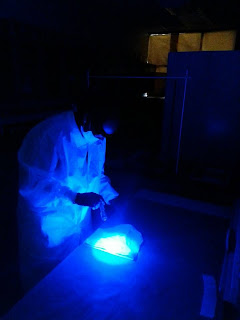
An investigator for the Office of Inspector General tests clothes for biological materials.
Ten investigators from the Office of Inspector General at TDCJ participated in the two week training offered by the National Forensic Science Technology Center, which provides specialized forensic science training through a grant from the Bureau of Justice Assistance. The training, hosted by the Correctional Management Institute of Texas, will assist investigators with examining sexual assault and aggravated assault cases, as well as processing the scene and collecting evidence from crimes that occur within TDCJ facilities.
 Investigators learned simple techniques to test biological evidence before sending it to the lab. “We have crimes that occur in prisons, and it gives us the ability to perform newer techniques and investigate leads that we would otherwise not have,” said Capt. Nathan Ward, who oversees training for the Office of Inspector General. “Say we find an offender who is unresponsive, but who is not bleeding. We can take his clothes and determine if blood is present. Using chemicals and other materials, we can determine if a crime has occurred or if there is a suspect. The fingerprinting will help us identify offenders or employees who smuggle in contraband. It was very, very relevant to what we do.”
. . . Read more . . .
Investigators learned simple techniques to test biological evidence before sending it to the lab. “We have crimes that occur in prisons, and it gives us the ability to perform newer techniques and investigate leads that we would otherwise not have,” said Capt. Nathan Ward, who oversees training for the Office of Inspector General. “Say we find an offender who is unresponsive, but who is not bleeding. We can take his clothes and determine if blood is present. Using chemicals and other materials, we can determine if a crime has occurred or if there is a suspect. The fingerprinting will help us identify offenders or employees who smuggle in contraband. It was very, very relevant to what we do.”
. . . Read more . . .
No comments:
Post a Comment